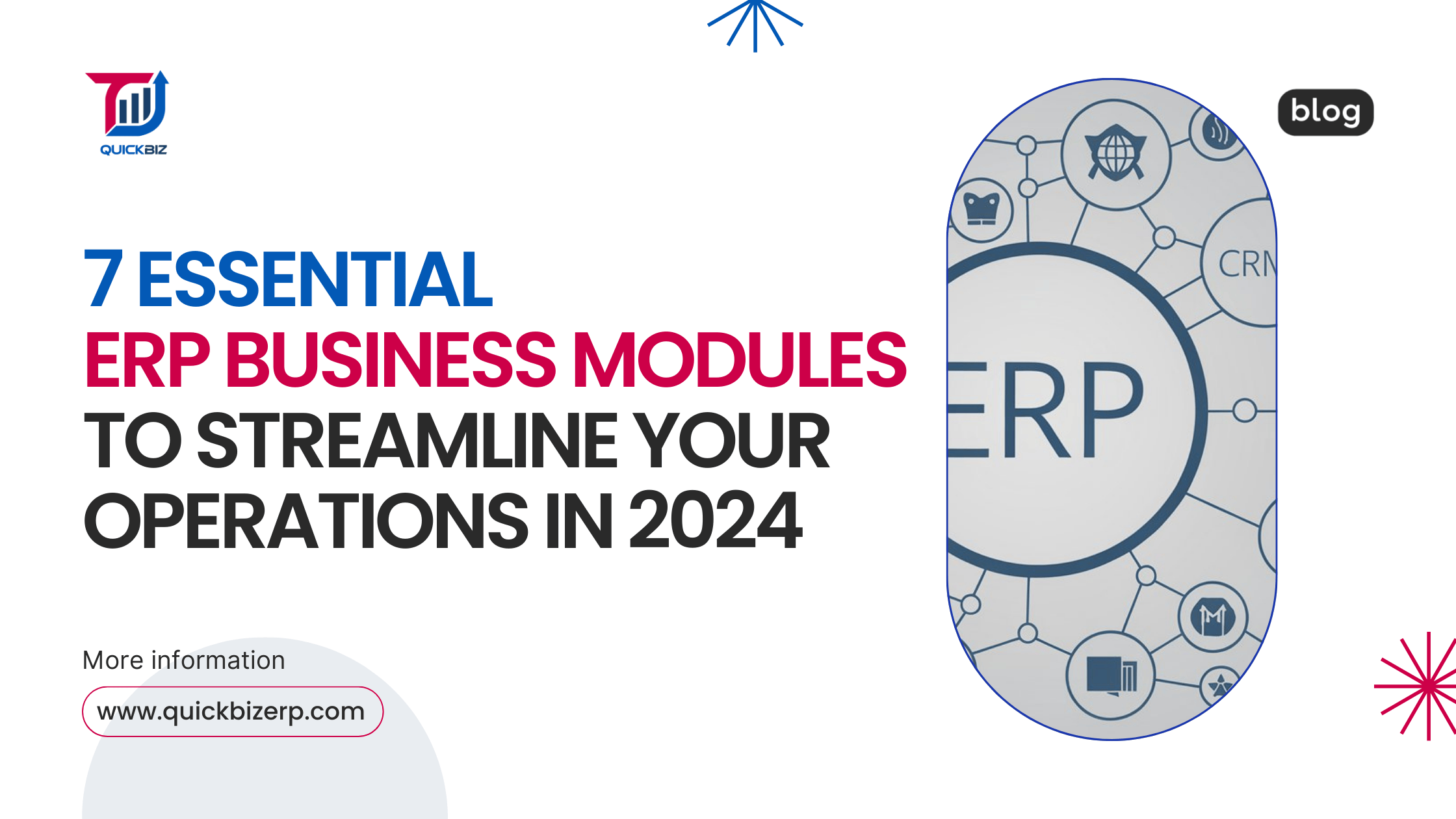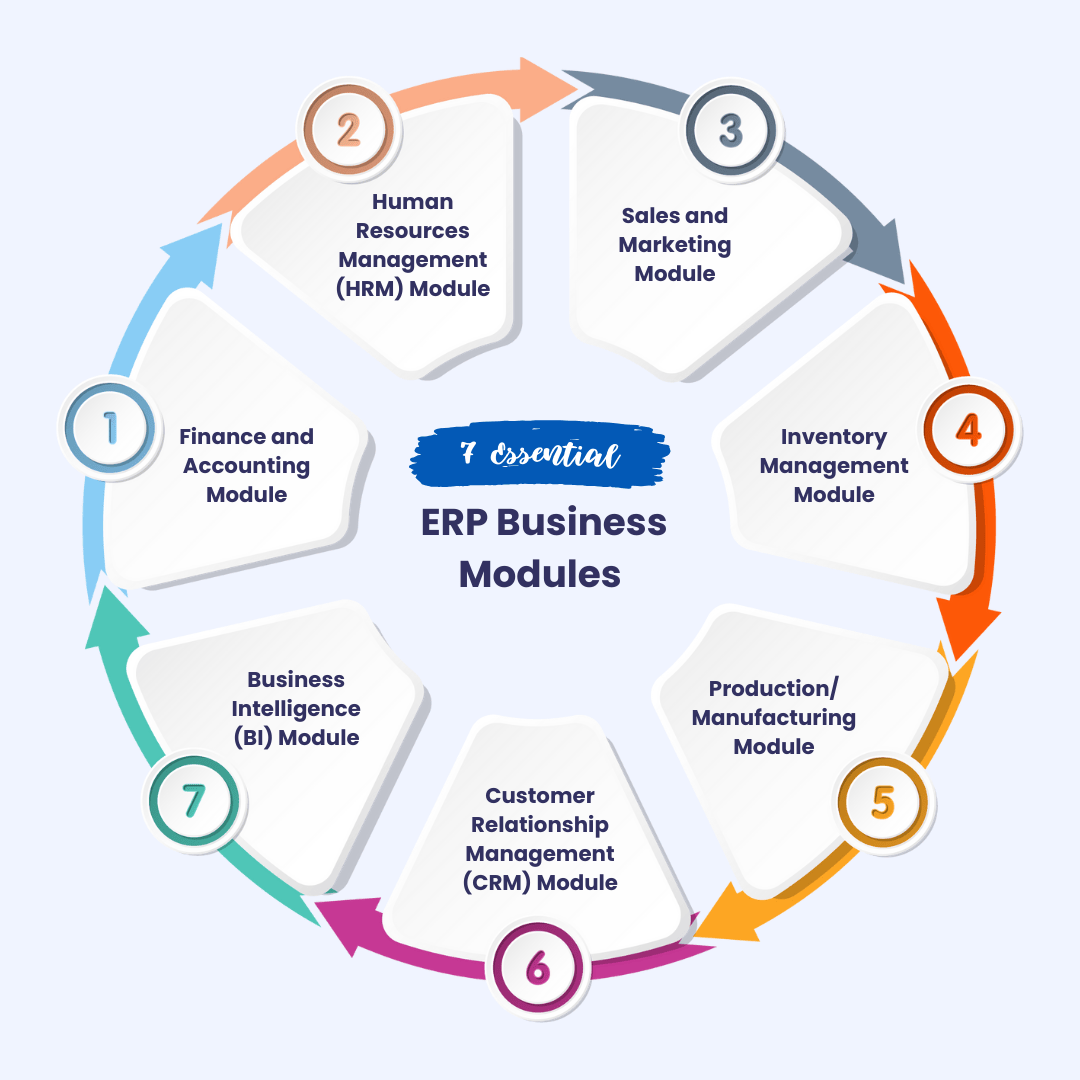7 Essential ERP Business Modules to Streamline Your Operations in 2024

Introduction
In today’s rapidly evolving business landscape, operational efficiency is key to staying competitive. Enterprise Resource Planning (ERP) systems have become a cornerstone for businesses, offering integrated solutions that streamline processes, improve accuracy, and enhance productivity. However, the true power of ERP lies in its modules—individual components tailored to meet specific business needs. Understanding these modules is critical for harnessing the full potential of ERP and achieving operational excellence in 2024.

1. Finance and Accounting Module
Features:
- Budgeting and forecasting tools
- General ledger management
- Automated financial reporting
Benefits:
This module simplifies financial operations, ensures regulatory compliance, and provides real-time insights into financial health, enabling businesses to make informed decisions quickly.
2. Human Resources Management (HRM) Module
Features:
- Payroll processing and benefits management.
- Recruitment and onboarding workflows.
- Employee performance tracking
Benefits:
By centralizing HR functions, businesses can enhance workforce productivity, reduce administrative burdens, and ensure seamless employee lifecycle management.
3. Sales and Marketing Module
Features:
- Customer relationship management (CRM).
- Sales tracking and forecasting tools.
- Campaign management for marketing initiatives.
Benefits:
This module helps build stronger customer relationships, track sales pipelines, and improve the overall customer experience, driving higher revenue growth.
4. Inventory Management Module
Features:
- Real-time stock tracking.
- Automated order fulfillment processes.
- Inventory level optimization.
Benefits:
With this module, businesses can reduce waste, prevent stockouts, and ensure timely order deliveries, enhancing supply chain efficiency.
5. Production/Manufacturing Module
Features:
- Workflow automation and resource allocation.
- Production scheduling and quality control.
- Equipment maintenance tracking.
Benefits:
This module streamlines production processes, minimizes downtime, and ensures consistent product quality, leading to operational excellence.
6. Customer Relationship Management (CRM) Module
Features:
- Centralized customer data storage.
- Analytics for customer behavior and preferences.
- Tools for personalized customer engagement.
Benefits:
By leveraging the CRM module, businesses can enhance customer retention, increase satisfaction levels, and drive repeat business through personalized experiences.
7. Business Intelligence (BI) Module
Features:
- Advanced data visualization tools.
- Predictive analytics and trend forecasting.
- Real-time reporting dashboards.
Benefits:
This module turns raw data into actionable insights, empowering businesses to make data-driven decisions and stay ahead of market trends.
QuickBiz ERP: The All-in-One Solution
Most of the features highlighted in these essential ERP modules are seamlessly integrated into QuickBiz ERP. Designed for businesses of all sizes, QuickBiz ERP offers:
- Comprehensive Module Coverage: Finance, HRM, CRM, and more, all under one platform.
- User-Friendly Interface: Intuitive design that simplifies complex processes.
- Scalability: Whether you're a growing startup or an established enterprise, QuickBiz ERP adapts to your needs.
- Cost Efficiency: Cloud-based solutions that reduce IT infrastructure costs while delivering maximum ROI.
With QuickBiz ERP, you can stay ahead of the curve by implementing cutting-edge ERP features that transform operations and drive growth.
Conclusion
ERP business modules are transformative tools that enhance various aspects of organizational operations. From finance to customer management, these modules work in harmony to improve efficiency and boost profitability. With solutions like QuickBiz ERP, businesses can take full advantage of these modules, ensuring long-term success in an increasingly competitive environment.

